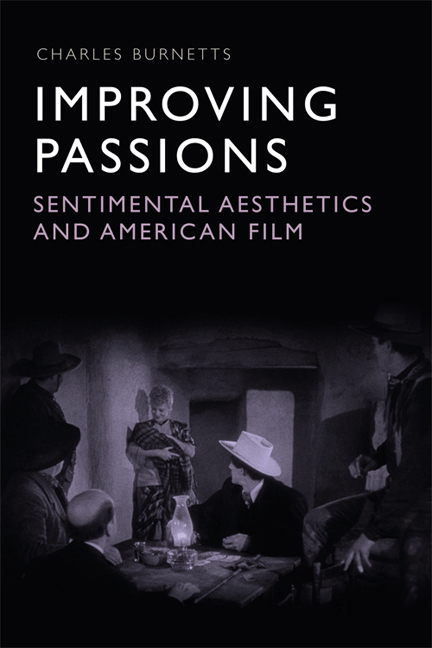Book contents
- Frontmatter
- Contents
- Acknowledgements
- Introduction
- 1 Towards a Genealogy of Sentimentalism in the Eighteenth and Nineteenth Centuries
- 2 Sentimental Aesthetics and Classical Film Theory
- 3 The Sentimental Chaplin: Comedy and Classical Narrative
- 4 Affect, or Postmodern Sentimentalism
- 5 The Sentiments of War in Spielberg and Tarantino
- 6 Sentiment and the ‘Smart’ Melodrama
- Conclusion
- Bibliography
- Index
Conclusion
Published online by Cambridge University Press: 20 December 2017
- Frontmatter
- Contents
- Acknowledgements
- Introduction
- 1 Towards a Genealogy of Sentimentalism in the Eighteenth and Nineteenth Centuries
- 2 Sentimental Aesthetics and Classical Film Theory
- 3 The Sentimental Chaplin: Comedy and Classical Narrative
- 4 Affect, or Postmodern Sentimentalism
- 5 The Sentiments of War in Spielberg and Tarantino
- 6 Sentiment and the ‘Smart’ Melodrama
- Conclusion
- Bibliography
- Index
Summary
In a 2010 article for The New York Times, literary theorist Stanley Fish comments on recent manifestations of the ‘crisis in the humanities’ in the form of language department closures at US universities such as at the State University of New York at Albany. Defending a ‘liberal arts’ education amid the neoliberalist reality of higher-education funding and knowledge production, Fish is nevertheless highly critical of a fellow respondent's claims concerning the value of the humanities. This respondent asks in his letter, ‘What happened to public investment in the humanities and the belief that the humanities enhanced our culture, our society, our humanity?’ Fish advises caution concerning this line of defence, arguing:
Well, it won't do to invoke the pieties informing [the above respondent's] question – the humanities enhance our culture; the humanities make our society better – because those pieties have a 19th century air about them and are not even believed in by some who rehearse them.
(Fish 2010)In the above, Fish foregrounds the problematics of a humanist defence of the arts and humanities, recognising issues in the respondent's statement that relate intimately to the problematics of sentimentalism in film theory and cultural criticism. This ‘improving’ discourse is one that is now almost indissociable from the exclusive focus on Western (male) individualist subjectivity and its sense of universalised progress and purpose in society. This is challenged by a more modern(ist) voice that has been long emergent since culture was conceived less in terms of moral improvement and more in terms of the autonomy that Adorno defended of the artwork in its evocation of self-reflexive knowledge production. It is this ambiguous discursive space that the chapters above have shown sentimentalism to occupy, as a concept invested in both the affective and ethical dimensions of cinema. Indeed, it has not been my intention here to mount a strident defence for the civilising, improving influences of the humanities, or indeed of film, in the face of Fish's comments, for as I hope to have shown in the above chapters, such ‘sentiments’ do indeed derive from the problematic hopes and aspirations of an era different to our own.
- Type
- Chapter
- Information
- Improving PassionsSentimental Aesthetics and American Film, pp. 158 - 165Publisher: Edinburgh University PressPrint publication year: 2017

